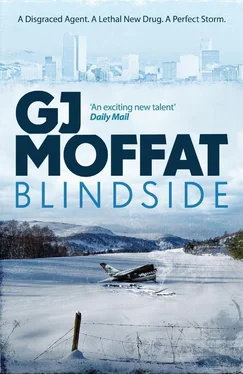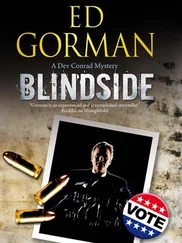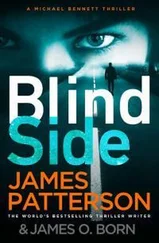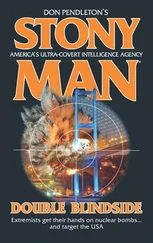G. Moffat - Blindside
Здесь есть возможность читать онлайн «G. Moffat - Blindside» весь текст электронной книги совершенно бесплатно (целиком полную версию без сокращений). В некоторых случаях можно слушать аудио, скачать через торрент в формате fb2 и присутствует краткое содержание. Жанр: Триллер, на английском языке. Описание произведения, (предисловие) а так же отзывы посетителей доступны на портале библиотеки ЛибКат.
- Название:Blindside
- Автор:
- Жанр:
- Год:неизвестен
- ISBN:нет данных
- Рейтинг книги:5 / 5. Голосов: 1
-
Избранное:Добавить в избранное
- Отзывы:
-
Ваша оценка:
- 100
- 1
- 2
- 3
- 4
- 5
Blindside: краткое содержание, описание и аннотация
Предлагаем к чтению аннотацию, описание, краткое содержание или предисловие (зависит от того, что написал сам автор книги «Blindside»). Если вы не нашли необходимую информацию о книге — напишите в комментариях, мы постараемся отыскать её.
Blindside — читать онлайн бесплатно полную книгу (весь текст) целиком
Ниже представлен текст книги, разбитый по страницам. Система сохранения места последней прочитанной страницы, позволяет с удобством читать онлайн бесплатно книгу «Blindside», без необходимости каждый раз заново искать на чём Вы остановились. Поставьте закладку, и сможете в любой момент перейти на страницу, на которой закончили чтение.
Интервал:
Закладка:
‘I like it,’ the passenger said. ‘So it looks like any other private cabin if anyone gets interested?’
‘Correct. That’s the way we planned it.’
Raines opened the door from the porch into the main building. Inside, the space stretched up to a double-height ceiling with a large, central area that was split into an office space at the back and a modest living area at the front — with couches facing an open fire.
There were two more men inside, both sitting in the office area working at computer monitors. They were dressed in jeans and heavy cotton shirts. Only the handguns in holsters fitted round their waists gave away their military background.
Raines went to the men and leaned over, looking at the spreadsheets open on both screens.
‘Looks good,’ he said, no emotion apparent in his voice.
Raines moved to the living area and motioned for the passenger to follow. They took their coats off and sat on separate couches, the passenger looking around the room and shifting in his seat. Raines looked at the man, trying hard to keep his hatred for him hidden. In this business, he didn’t have the luxury of choosing whom he worked with. The man wore what looked like an expensive suit and a white shirt open at the neck. His black leather town shoes were flecked with melting snow.
‘Perimeter security?’ the man asked.
‘Motion sensors. We have them linked to the computers back there.’
The man frowned.
‘No fences?’
‘Other than at the front, no.’
‘Doesn’t sound very safe.’
The man picked an imaginary piece of dust from his immaculately pressed trousers. Raines noticed his accent now for the first time. He did a good job of hiding it.
Raines resisted an urge to pull his handgun and shoot the man in the face.
‘It’s completely safe,’ Raines said instead, leaning forward and resting his elbows on his knees.
‘How?’
‘Well, I mean, you saw the fence at the gate we came in through, right?’
The man nodded.
‘That stretches both ways to sheer drops down the mountainside. So we’re covered on both flanks by the natural terrain. No one’s getting in that way unless they’re prepared for a long climb.’
‘And even if they do get up, you have the motion sensors?’
‘Now you’re getting it.’
‘And at the back?’
‘The only way in to the back is over the top of the mountain from the other side. Ain’t gonna happen.’
‘And, again, the motion sensors.’
‘Those are located a minimum of one mile from here. And we have ordnance planted in the ground and on trees a half-mile in. Either remote triggered or via tripwires.’
‘Impressive.’
Raines leaned back in the couch.
‘Anyone comes here up to no good and they end up dead.’
‘You consider the federal authorities carrying out their lawful duties to be up to no good?’
‘Especially the Feds.’
Raines stared at him but did not reply. The man turned away from Raines’s hard gaze, pretended to look around again at the interior of the building to demonstrate that he had not been intimidated.
‘Let’s talk business,’ Raines said.
2
After their brief discussion, Raines waited in the main building while one of the men from the office showed his passenger around the rest of the compound.
He walked to a door at the back of the living area and went through it into his own private office space. He sat at the sparse desk and breathed deeply, feeling more tired than he ever had.
The drive up the track to the compound brought back the memories again: him and the other soldiers inside the Land Rover as it pitched and rolled over the rutted dirt tracks that passed for roads in Afghanistan.
They had waited at the site of the opium field for less than an hour, the splash of pink flowers almost surreal in the washed-out haze of the desert.
The soldiers kept mobile, not resting in one location and aware of their surroundings. Never straying too far from the track around the field for fear of wandering into an active minefield. Raines had seen two men from his platoon with traumatic amputations from mine blasts. They had survived, thanks to the swift treatment they received from the medevac team, but their lives would never be the same again.
After the local ANP contingent had set fire to the field and the blaze had well and truly taken hold, they went back to the Land Rovers. The temperature was now close to forty degrees and was taking its toll on them.
They took up the same positions on the rear bench seats as before. No one said anything as the Land Rover moved off, all of them watching the dark smoke rising from the poppy fields into the clear, blue sky.
They drove back through Lashkar Gah and Raines was again struck by how primitive the place was, although he had been there many times before. The buildings were almost invariably made from mud and bricks and the roads were no better than the track they had followed from the camp.
There were no women to be seen anywhere and men with lines etched in their faces watched the convoy pass by. Occasionally a group of children would run alongside, shouting and waving at the soldiers.
Horn turned in his seat and waved back at one particularly enthusiastic boy who kept pace with them for a good fifty metres. Johnson shook his head.
‘What?’ Horn asked, annoyed.
‘Nothing,’ Johnson said.
Horn stared at him.
‘Even after being here this long you can still relate to these people?’ Johnson said after a moment.
‘What else is it that we’re supposed to do?’
Raines sensed the animosity between the two men, but did not interfere. Soldiers have to learn by getting their hands dirty. Or bloody. And aggression was part of the job description. But he admired Horn’s resilience — wasn’t such a bad kid for a soft, middle-class boy who volunteered to go to war. Raines thought, not for the first time, that if his own son had lived past his sixth birthday he would have been proud if he had turned out like Matt Horn.
They passed through a more modern-looking part of town and the lieutenant asked why the rest of it was so primitive.
‘This is Little America,’ Raines told her. ‘We were over here in the sixties. Built some stuff and headed home again.’
‘No one ever stays in places like this for long,’ she said.
‘Is that what your job is about?’
‘What do you mean?’
‘Trying to make it right with the locals. I mean, build their trust. Tell them we’ll be here till everything is all right. That it will be different this time.’
‘Yes. Don’t you have something similar?’
‘We do,’ Raines said, smiling.
A look of annoyance passed over her face.
‘And there’s something wrong with that in your mind, Sergeant?’
‘No. I mean, I recognise that the intention is pure.’
‘But…’
Raines shifted in his seat and turned to face her. He noticed up close how young she was — like a lot of the officers over here in both armies. Probably straight out of officer school and posted here with no in-theatre experience.
‘But it doesn’t help us much,’ Raines went on. ‘When we call in fast air support to drop a couple of five-hundred pounders on a suspected Taliban compound and go in to clean up the mess only to find children’s body parts and screaming women.’
The lieutenant’s eyes narrowed.
‘That’s what happens in a war,’ Raines went on. ‘We can’t avoid civilian casualties. How do you explain that to their mothers and fathers?’
‘We can only do what we can. But we still have to try. Or don’t you believe that?’
Raines turned from her and saw that Johnson was watching their exchange intensely.
Читать дальшеИнтервал:
Закладка:
Похожие книги на «Blindside»
Представляем Вашему вниманию похожие книги на «Blindside» списком для выбора. Мы отобрали схожую по названию и смыслу литературу в надежде предоставить читателям больше вариантов отыскать новые, интересные, ещё непрочитанные произведения.
Обсуждение, отзывы о книге «Blindside» и просто собственные мнения читателей. Оставьте ваши комментарии, напишите, что Вы думаете о произведении, его смысле или главных героях. Укажите что конкретно понравилось, а что нет, и почему Вы так считаете.












